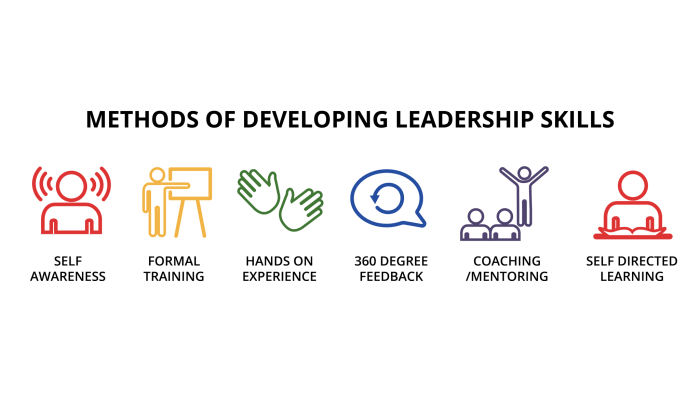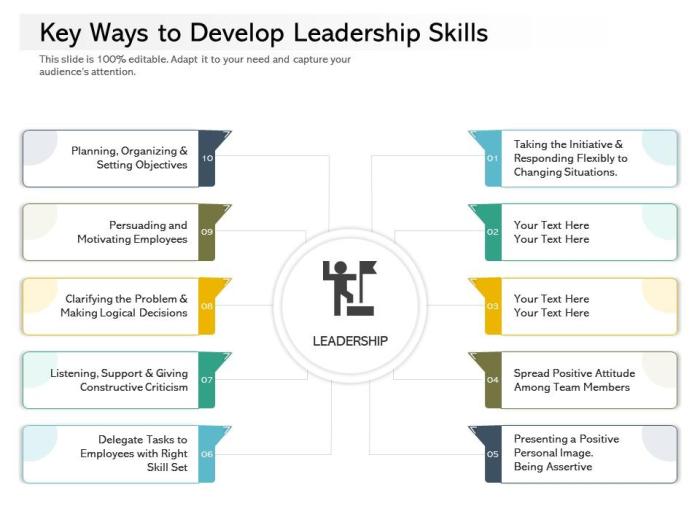Developing Leadership Skills takes center stage, inviting you into a world of growth and empowerment. Get ready to explore the keys to success in personal and professional life through effective leadership.
Let’s dive into the essential aspects of developing leadership skills and how they can shape your journey towards becoming a successful leader.
Importance of Developing Leadership Skills
Leadership skills are crucial in various aspects of life as they empower individuals to guide, inspire, and motivate others towards a common goal. Successful leaders exhibit qualities such as effective communication, decision-making, and problem-solving, which are essential for navigating challenges and driving progress.
Examples of Successful Leaders
- Steve Jobs: The co-founder of Apple Inc. demonstrated visionary leadership by revolutionizing the technology industry with innovative products like the iPhone and iPad.
- Oprah Winfrey: As a media mogul and philanthropist, Oprah Winfrey’s leadership skills in communication and empathy have made her a respected figure in the entertainment industry.
- Nelson Mandela: The former President of South Africa showed exceptional leadership qualities like resilience and forgiveness, leading the country through a peaceful transition to democracy.
How Leadership Skills Contribute to Growth
Developing leadership skills contributes to personal and professional growth by enhancing self-confidence, decision-making abilities, and adaptability to change. Leaders who continuously improve their skills can inspire others, foster innovation, and create a positive impact on their communities.
Enhancing Teamwork and Collaboration
- Effective leaders can build strong teams by fostering a culture of trust, respect, and open communication.
- Leadership skills like delegation and conflict resolution help in promoting collaboration and achieving collective goals.
- By empowering team members to contribute their unique strengths, leaders can maximize productivity and drive success in projects and initiatives.
Key Leadership Skills to Develop

Developing leadership skills is essential for success in any field. Here are some key skills that aspiring leaders should focus on honing:
Communication
Effective communication is crucial for leaders to convey their vision, delegate tasks, and inspire their team. Strong communication skills help in building relationships, resolving conflicts, and fostering a positive work environment.
Decision-Making
Leaders must make tough decisions under pressure. Developing the ability to analyze situations, weigh options, and make sound decisions is vital for effective leadership. Decision-making skills are honed through experience and continuous learning.
Problem-Solving
Leaders often encounter complex problems that require innovative solutions. Developing strong problem-solving skills involves critical thinking, creativity, and the ability to collaborate with team members to find effective solutions.
Emotional Intelligence, Developing Leadership Skills
Emotional intelligence is the ability to understand and manage one’s emotions and empathize with others. Leaders with high emotional intelligence can build strong relationships, inspire trust, and navigate challenging situations with grace.
Adaptability and Resilience
In today’s fast-paced and ever-changing work environment, leaders must be adaptable and resilient. The ability to pivot quickly, embrace change, and bounce back from setbacks is crucial for effective leadership.
Mentorship and Coaching
Mentorship and coaching play a significant role in developing leadership skills. Learning from experienced leaders, receiving feedback, and seeking guidance can help aspiring leaders grow and improve their abilities.
Strategies for Enhancing Leadership Skills
To become a more effective leader, it is crucial to develop strategies that will help enhance your leadership skills. These strategies can help you set clear goals, improve your communication, and build stronger relationships with your team members.
Setting Leadership Development Goals
- Start by assessing your current leadership skills and identifying areas for improvement.
- Set specific, achievable goals that align with your values and long-term objectives.
- Create a timeline for achieving these goals and track your progress regularly.
Importance of Seeking Feedback for Continuous Improvement
Feedback is essential for growth and development as a leader.
- Solicit feedback from peers, mentors, and team members to gain different perspectives on your leadership style.
- Actively listen to feedback without becoming defensive and use it to make positive changes.
- Regularly seek feedback to continuously improve and refine your leadership skills.
- Give your full attention to the speaker, maintain eye contact, and avoid interruptions.
- Show empathy by putting yourself in others’ shoes and understanding their perspectives.
- Ask clarifying questions and paraphrase to demonstrate active listening and ensure understanding.
- Identify your core values and align your leadership approach with them.
- Lead by example and demonstrate the behaviors you expect from your team members.
- Communicate openly and transparently to build trust and credibility with your team.
- Acknowledge their accomplishments and skills.
- Seek feedback and validation from trusted mentors or colleagues.
- Practice self-compassion and remind themselves of their strengths.
- Focus on continuous learning and growth to boost confidence.
- Active listening to understand all perspectives.
- Encouraging open communication and dialogue to find common ground.
- Remaining calm and composed under pressure.
- Seeking win-win solutions that benefit all parties involved.
- Set clear expectations and boundaries while remaining open to feedback.
- Show empathy and understanding towards team members.
- Lead by example and demonstrate the values they expect from their team.
- Build trust through transparency and consistency in decision-making.
Tips for Practicing Active Listening and Empathy in Leadership Roles
Strategies for Developing a Leadership Style that Resonates with Your Values and Goals
Challenges in Developing Leadership Skills

Developing leadership skills can be a challenging journey filled with obstacles that individuals must overcome to reach their full potential as effective leaders. These challenges can range from internal struggles like imposter syndrome to external conflicts and difficult situations that arise in leadership roles. Below, we explore some common challenges faced in developing leadership skills and strategies to tackle them head-on.
Imposter Syndrome in Leadership Roles
Imposter syndrome is a common challenge that many leaders face, where they doubt their abilities and feel like they don’t deserve their position of authority. To overcome imposter syndrome, leaders can:
Handling Conflicts and Difficult Situations
Conflicts and difficult situations are inevitable in leadership roles, but effective leaders know how to navigate them with grace and diplomacy. Strategies for handling conflicts include:
Balancing Authority and Approachability
One of the key challenges in leadership is striking a balance between being authoritative and approachable. To achieve this balance, leaders can:
